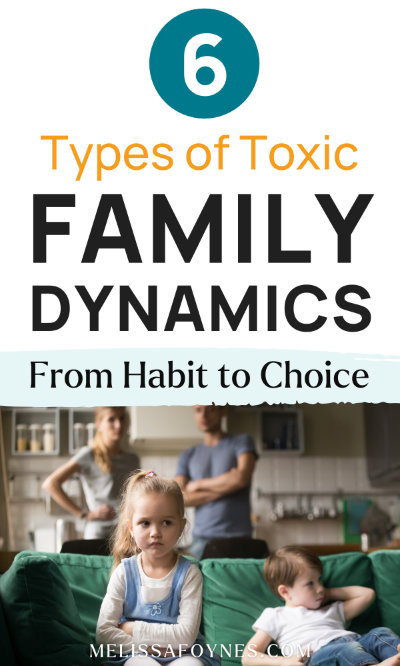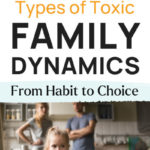welcome, I'm Melissa
Links
As a holistic coach, psychologist, mindfulness, meditation & yoga instructor, & Ayurvedic doula I offer personalized paths to growth & healing.
you may also like...
6 Types of Family Dynamics: From Habit to Choice
May 6, 2021
Understanding how our past family dynamics contribute to the development of certain behavioral patterns is important so we can choose how to respond in adulthood.
As children, these patterns or tendencies are often adaptive, helping us both survive and learn how to have our needs met.
However, those same patterns can later cause problems in adulthood (unhealthy family dynamics), such as creating challenges in our relationships or difficulties in the ability to express our emotions.
Family Dynamics Meaning
Becoming aware of how we are shaped and influenced by past family dynamics allows us to move from habit to choice.
We can choose which tendencies from our past we’d like to maintain and let go of those that no longer serve us.
So what are the early roots of some of our patterns, and how do we identify them?
Focusing on specific behaviors and tendencies that emerged from our families of origin offers opportunities for self-reflection.
We’ll Explore 6 Types of Family Dynamics:

- Conflict resolution
- Criticism
- Emotional response
- Absent caregivers
- Family secrets
- Crisis and chaos.
To consider how these patterns might operate in your life and foster curiosity about how these patterns do or don’t serve you — some key questions for self-reflection are included.
The goal is not for you to develop an exhaustive list of all of the ways in which you were affected by your families of origin, but rather to equip you with a process of self-reflection.
This will enable you to move from a place of conditioned response to one of intentional choice.
These types of family dynamics operate on a continuum.
You could be high, low or moderate in any one particular area, and none of these tendencies or patterns is mutually exclusive.
We can all have elements of some of these patterns in different situations with different people, including tendencies that seem somewhat contradictory or opposite.
>> Consider your responses to the following types of family dynamics as a springboard for your self-inquiry in better understanding the influence of your family of origin.
1. Conflict Resolution

There are two ends of the spectrum when it comes to conflict resolution.
High Conflict
We have family systems that tend to be high in conflict. This can include arguing caregivers who may be very strict or reactive.
When children make mistakes or are perceived as not behaving, family members feel as though they are “walking on eggshells.”
There can also be a certain level of unpredictability as well as verbal and emotional abuse, physical abuse, and aggression.
Low Conflict
In these family dynamics, conflict might be avoided, and the importance of agreement with each other may be overemphasized.
This can often lead to a sense as though there’s an elephant in the room that no one’s talking about.
Minimal displays of emotion, whether emotions we consider as more positive as well as more negative, are common.
Depending on how your family of origin is related to conflict, certain tendencies can emerge.
One is more of a peacemaker tendency. As a child, you may have played an intermediary role, often trying to translate or explain what different members of the family might have meant when they said certain things.
Also, you may have attempted to soothe the tension and help resolve the conflict.
This kind of peacemaker tendency can be really helpful. People who develop these skills in childhood can be very good at seeing and acknowledging multiple perspectives and can be very well equipped at validating those different perspectives and helping people feel understood.
At the same time, those who have a peacemaker tendency can tend to focus on others at the expense of themselves when it comes to conflict, minimizing their own needs for the sake of group cohesion and harmony.
Depending on where a family falls on the conflict resolution spectrum, patterns with a more argumentative tendency can emerge.
If you grow up in a high-conflict family system, you may be conditioned to be more high conflict; you may have a tendency to participate in the high-conflict resolution style that has been modeled to you.
Perhaps you’re very quick to react, and it takes you some time to cool off. A high state of conflict may feel normative to you.
This more argumentative tendency can be helpful by empowering people to feel emboldened to challenge the status quo. Feeling confident in playing the devil’s advocate and disrupting certain systems or rules can lead to a level of questioning that can result in change.
And at the same time, this high conflict pattern can be harmful.
We can fall into a trap of challenging just for the sake of challenging even if we’re not truly invested in a particular point of view.
Because the act of challenging is a place of comfort, it helps us feel in control. And if we tend to respond with a lot of reactivity and defensiveness, we can perpetuate conflict in our personal relationships and elicit defensiveness in others.
This can lead to distancing and disconnection in our relationships.
Where do you fall on the conflict resolution spectrum? Ask yourself:
- How comfortable are you with conflict?
- How do you tend to respond to conflict?
- Do you tend to avoid or withdraw from conflict?
- Do you try to rush in and save the situation?
- Do you notice yourself seeking out conflict?
- Do you find comfort in conflict?
- Are you able to hold space for multiple perspectives simultaneously, or do you feel compelled towards needing to create a hierarchy in which someone is right and someone is wrong?
All of these questions are useful in thinking about your current responses to conflict and how your family dynamics roles of the past may influence your present behavior.
RELATED: SIGN UP TO OUR FREE 4-PART VIDEO SERIES…
THE SCIENCE AND SOUL OF BUILDING RESILIENCE
LEARN MORE HERE!
2. High Level of Criticism
Growing up in a family dynamic with a high level of criticism means we may have internalized a message that criticism makes us stronger, or that criticism is a way of showing love and is a way of getting your needs met.
This type of family dynamic can lead to a lot of guilt and shame in response to making mistakes.
These family systems can vary in terms of the type of criticism and the way it’s delivered.
Here are some ways that criticism can be communicated.
- Name-calling
- Disparagement
- Humiliation
- Contempt
- Emotional abuse
- Bullying
- Manipulation
There can also be criticism that isn’t really intended to hurt or to criticize but does nonetheless.
So it’s important to consider some of the nuances that exist within the dynamic of high criticism.
Example:
A family member might say something like…
“Oh, I really wish you hadn’t done that” with an exasperated voice.
The result: This can be experienced as enormously critical and invalidating to a child.
Having a high level of criticism in your family dynamics can develop certain behaviors, such as…
Being an Overachiever
Being an overachiever can be helpful in creating ambition, a willingness to work hard and a focus on achievement.
However, on the flip side, it can be unhelpful.
Overachievers tend to fill their schedules, feeling more comfortable with a lot of action and less comfortable with downtime.
Very full schedules can lead to burnout and make it hard to rest or be still.
The tendency to overachieve may result in perfectionistic traits.
We can also have low self-worth and tie our worth to our achievements, which is very fragile because we’re not always successful.
Being Comfortable with a High Level of Criticism
Another pattern is that we might seek out criticism without necessarily being aware of doing so.
We may find ourselves more comfortable with a high level of criticism because we’re used to it, and even though it’s harmful, it feels more comfortable.
We also may not trust relationships in which people are not critical, and some insecurity can develop when criticism isn’t present.
Some questions to consider regarding criticism include:
- Do you tend to avoid criticism, or do you find some comfort and reassurance in it?
- To what extent are you highly critical of yourself?
- How easily do you recover from criticism from other people?
- Do you have a tendency to overperform, or do you have a tendency to underperform?
- Do you find that criticism is a theme in your relationships?
- Do you tend to find yourself in either romantic or platonic relationships with people who are really judgmental?
Those who were raised in highly critical family systems may have self-invalidating tendencies or tendencies towards low self-worth and low self-confidence — because we have internalized criticism from our families of origin.
Related: How to Overcome Self-Criticism: 3 Holistic Strategies
3. Emotional Response

Many of us have grown up in family systems with a more inhibited relationship to emotions, including…
- A lack of physical touch, or
- A lack of physical expressions of affection
Having a Low Intensity of Emotions
A low intensity of emotions may be expressed and an internal processing of emotions emphasized. Or perhaps emotions are fully suppressed — even when there is significant grief or trauma.
Having an inhibited way of experiencing emotions can become protective, especially if the expression of emotions was punished, ridiculed, or created an unsafe physical or emotional situation in our families.
On the other hand, it can be unhelpful:
- Having an inhibited relationship to our emotions can lead us to be less aware of our emotions feel as though our emotions are wrong.
- Communicating our emotions can be difficult for us.
- We can inhibit grief or the processing of painful emotions as well as our experience of joy.
- Have a tendency to withdraw from others or inhibit the importance of intuition.
Having Highly Expressed Emotions
By contrast, some family systems are highly expressive of emotions, including families rewarding intense displays of affection or emotion.
These systems may also emphasize the importance of talking about emotions to process situations involving family members.
This more emotive style can be helpful by:
- Being more effective in articulating our feelings to others
- Using emotional expression and processing as a form of catharsis
Or unhelpful:
- We may have a tendency to quickly escalate our emotions, especially if that’s what it took to get our needs met in our families.
- We can also find ourselves dominating relationships with people who have a softer style of expressing or experiencing their emotions.
Some questions to consider regarding your emotional responses include:
- Were you ever criticized, judged or invalidated for your feelings growing up?
- Were you discouraged from showing or experiencing emotion?
- Was it viewed as weak to experience or express emotion?
- Were certain emotions considered to be more valid than others?
- Do you feel as though you can express emotions in different ways, including through physical touch?
- What kinds of emotions in your family of origin were expressed and how were they expressed?
- Do you find that you tend to exaggerate your emotional experiences in order to feel heard?
- Do you feel badly when you’re not able to demonstrate emotions outwardly or process them externally?
Lastly, if we grow up in family dynamics that are highly expressive but our natural tendency is to be shy or more inhibited with our emotions — we can feel like an outsider as if something is wrong with us.
This is because there’s a poor fit between our natural tendency and what is normal in our family system.
As adults, this can make it difficult to accept and trust ourselves as well as our relationships.
4. Absent Caregivers
Whether caregivers are absent because they are distracted, they work a lot, they are very self-focused or they are neglectful, the impact can be similar.
In this type of family dynamic, we can develop a tendency towards caregiving.
We can lean towards taking control in situations, caring for others and developing an acute sensitivity and awareness of other people’s needs and emotions.
This can be helpful because it can lead to a nurturing, compassionate and inclusive style in which we’re very considerate of others and sensitive to their needs.
The Problem:
However, we can also be so vigilant to other people’s emotions that we don’t really consider our own needs, and we can have a hard time in situations when others don’t need our help.
So this type of pattern can create a need to be needed, and we can tie our worth to our ability to take care of others and feel bad when we can’t.
This family dynamic can also lead to:
- A tendency towards nurturance-seeking behavior, motivating us to seek connection with others.
- Being very committed to prioritizing connection and investing in maintaining relationships.
- We can become overly reliant on relationships for validation, our sense of self and our self-esteem.
Some questions to consider for family systems with absent caregivers include:
- Do you tend to take charge and take care of difficult situations?
- Do you find yourself being very sensitive to other people’s needs?
- Do you find that you often overextend for others or focus more on other people rather than yourself?
- Do you tend to other people before you tend to your own needs when it comes to self-care, emotional processing or other kinds of needs?
- Do you find it difficult to address what isn’t working in relationships?
- Do you find yourself staying in relationships for longer than might have been ideal?
- Are able to make decisions without consulting others?
- Do you find it difficult to justify or feel grounded in your decision-making if other people disagree?
In family systems with absent caregivers, it’s important to also highlight the impact of grief and stress on the system.
Examples of significant grief or stress, whether it was acute or chronic might include:
- Extreme poverty
- Difficulty with getting financial needs met
- Lack of consistent shelter or food
- A single-parent household
- Death of family members
- Mental health or addiction challenges with one or more family members
- Could involve dealing with ongoing discrimination or oppression.
With this type of toxic family dynamic, one kind of pattern that can emerge is a tendency towards optimism, lightheartedness and a sense of humor.
This tendency can be a powerful antidote to grief and stress, allowing us to be resilient and to recognize that, even in the midst of grief and stress, there is room for joy.
People with this tendency can also have a certain positivity and optimism when dealing with difficult situations, and they can have a basic trust that things are going to be okay even if they are extremely challenging.
This optimism and lightheartedness can also lead to some harmful tendencies, resulting in a kind of toxic positivity and self-invalidation that prevents us from acknowledging hardships.
We can also be overly forgiving of other people in a way that allows them to take advantage us.
5. Family Secrets or Secrets with an Element of Betrayal

Family secrets could be centered on sexual abuse and other kinds of abuse, or not sharing with others that there is addiction or mental health struggles in the family.
Or there could be secrets related to unhappiness in a marriage, such as infidelity, or other forms of dishonesty within the family.
When we keep secrets, the utility is that other people view us as loyal and trustworthy; we can be very effective confidants.
By contrast, when we’ve grown up with the message that certain things cannot be revealed, a sense of shame can be fostered.
We may find it difficult to be vulnerable, emphasizing the importance of hiding feelings or certain behaviors in fear of a negative consequence.
This increases anxiety and discomfort about people knowing who we truly are. We can also become very sensitive to our perceptions that others are lying to us and become hypervigilant to signs of dishonesty.
And when someone does actually lie to us or misrepresent something, a very deep core wound can be activated. Families with secrets and betrayals can also lead us to a sense of being an imposter and being inauthentic.
Some questions to consider regarding your relationship to honesty include:
- Is honesty something that you highly value, or do you minimize the importance of it?
- To what extent do you prioritize honesty in your relationships with other people?
- Is it hard to acknowledge to yourself things that bring up shame, insecurity or fear?
- What is it like for you when you find out that someone has not been fully honest or transparent with you?
- Do you feel like you can truly be yourself without hiding?
- Do you equate confrontation with disloyalty?
- Do you find it hard to seek support from others for fear of betraying someone else?
- Do you feel a lot of guilt?
- Does it feel like sharing a story about what’s going on in your life is a form of betrayal?
Family systems with secrets can also lead to a truth-telling tendency, a tendency to call it like it is. This can be really helpful because it can engender trust. When we know someone is willing and able to be honest with us, our ability to trust is enhanced.
However, growing up with so much secrecy can also create a need to rail against that dynamic, and we can be overly blunt.
We can sometimes harshly give advice and feedback when it’s not solicited, and we can be intolerant when it’s hard for others to be candid or fully honest.
6. High Level of Crisis, Chaos and Unpredictability
This could be a toxic family dynamic with relentless stressors.
Maybe it’s caused by financial instability or due to abuse, whether it’s a caregiver or another family member perpetrating the abuse.
Or maybe a caregiver has a history of unresolved abuse or trauma, resulting in a certain level of chaos and unpredictability.
High levels of crisis and chaos could also be the result of addiction, mental health issues, serious medical conditions, gambling, or parents who are very temperamental and emotionally unpredictable.
This type of family dynamic can lead to:
- A thrill-seeking tendency
- Being more comfortable in chaos and disorganization, which can lead to a strong sense of adventure
- Doing very well in high-stress environments, and we may have developed skills for being very calm in a crisis.
However, the unhelpful side of this type of family dynamic is:
- Having comfort in chaos and crisis
- We may tend to seek out thrills in ways that are risky like extreme physical activities, substances or some other means
- Having difficulty with boredom
- Being uncomfortable with having schedules, or regular sleep and wake times.
- Having a hard time in relationships that aren’t conflictual, including being sexually intimate or emotionally intimate unless there is high conflict and a high frequency of fighting
Some questions to consider for family dynamics with high levels of crisis, chaos and unpredictability:
- Do you perform best under pressure?
- Do you tend to procrastinate?
- Are you often late?
- Do you notice that you tend to push people’s buttons and test boundaries in relationships even without intentionally doing so or meaning to do so?
- Do you enjoy activities that produce an adrenaline rush?
- Do you often pick fights with other people for the sake of doing so to test their love for you?
- Is it hard for you to feel a sense of love, passion or intensity of other emotions in the absence of conflict?
Another way in which this family dynamic can play out is in a more solitude-seeking tendency. If we grow up in an environment with a lot of crisis, chaos and unpredictability, we may then respond by wanting low crisis, low chaos and lots of predictability.
That may mean an abundance of solitude and stillness.
We may be very independent and comfortable being alone; we can find restoration and relaxation in quiet and stillness.
On the other hand, this tendency can be unhelpful if it leads us to withdraw and isolate, not trusting that others will be there for support.
We can also be overly reliant on ourselves, believing that others aren’t going to be there for us, which can lead to ambivalence about relationships or difficulty being vulnerable.
Understanding These Types of Toxic Family Dynamics:
None of us are immune to the effects of our families of origin.
We all have certain patterns or tendencies that emerged and were reinforced by our family systems.
And though these patterns or tendencies served an important function, there may be ways in which they are no longer adaptive or helpful.
When we can recognize why they existed and how they emerged, we can have more self-compassion for ourselves, which enables us to transform and make changes in our lives.
This process of self-inquiry about our family dynamics can promote that understanding, allowing us to move from habit to choice.
Unhealthy Family Dynamics: Next Steps
To find support and help you navigate the complexity of your family dynamics, learn more about my 1on1 coaching program.
If you’d like to delve deeper into an understanding and awareness of family dynamics — and their role in shaping your current behavior listen to the full podcast episode…
MAKE SURE TO SUBSCRIBE TO THE SCIENCE & SOUL OF LIVING WELL PODCAST.
Apple | Google | Spotify | iHeart | Audible
You can also contact me or join us on Instagram – @drfoynes.
Family Dynamics – From Habit to Choice: Resources
Freebie Alert!
Freebie Alert!
Newsletter
Sign up to get a dose of love, inspiration, wisdom &
all the latest news on events straight to your inbox.
privacy
terms
made with ❤ by habitat society
Explore
©2022, Melissa foynes
Thank you
You're subscribed to my newsletter. Please whitelist my email to make sure you don't missing anything I send you.
